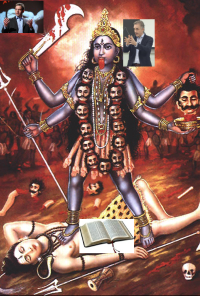Chapter 4
On the systematization of: The distribution of authority and The evaluation of ideas
First the evaluation of ideas. If a socratic character put forth an argument, anyone else has the right to question him or her. This socratic individual can pick and chose which questions they answer, but if the community can determine that the individual tends to not answer questions that make them look bad, this pattern can be understood. What about a simple pros and cons approach? Users put forth what they deem the pros and cons. These are sorted and weighed continually. Who makes the final judgement? Is it one person who looks at the pros and cons and comes to a decision? Or a committee? Which people are on this committee? If the questions being posed are scientific in nature, shouldn’t this committee be made of people who have knowledge and experience in the field in question? Should the neuroscientists decide amongst themselves who the big boss of neuroscience is? Do we need this boss? And should the neuroscientists really have full control? Or maybe they get 50%. The other 50% of authority over the makeup of the committee of head neuroscientist is given to the collective. The collective might manifest this authority by agreeing amongst themselves that any candidate should be trustworthy to a certain extent. That any candidate needs to have x number of years of experience. In this way the collective might come up with the requirements and then the neuroscientists would have to use these requirements. And if the neuroscientists disagree with the requirements, they have the same ability to put forth arguments as anyone else. If they think the experience limitation is too low, or too high, or even altogether unnecessary; they can carefully explain why this is so. Their knowledge on the subject is understood as variables and are among the variables that are considered algorithmically. In this sense, that 50% that is left to the collective is actually partially made up of the judgment, wisdom, and argument of neuroscientist. And why not? Don’t they know what they are talking about?
Now the authority part. I should note that authority as we know it was actually baked into that last thought experiment. Perhaps to look at authority in its own right isn’t very helpful. If users are collectively deciding the characteristics of various versions of the website, then why not stop here? Why must there be an extra layer of authority? Can this extra layer exist alongside the lower layer, similar to how the logo was described to work? The core of the thing is determined by all, but as the layers move outward the authority is handed out more selectively. Which of these approaches would align more with the title Democratic Meritocracy?
Continuing with the authority theme, who exactly is responsible for firing people? It is clear that, in certain circumstances the termination of employment is an idea that doesn't really apply. If a person makes some money editing scientific papers, but they seem to make many errors, this tendency of error would be public knowledge. The person doesn’t need to be fired, they will reap what they sow. And if they want to improve their ability to edit scientific papers, they will be given both the opportunity and a method by which they can improve. After improving, they can demonstrate their new level of skill by taking a test, or by editing dummy papers. Eventually they would build back their trust with the community. What good what it do to have someone call this individual and tell them their work is subpar. The individual will every opportunity to discover this. To be sure, some workers might benefit from being responsible to some kind of manager character. Some who can light a fire under their ass, so to speak. Perhaps they have weekly facetime conversations with their manager, wherein the manger can remind the worker what their deadlines are. Or the manager would remind the worker how exactly they can go about asking questions or getting help. Both the worker and the manager rate each other. While it is possible for the worker to leave unfair review, the system can help with this. If the worker mentions specific things, such as the manger consistently not being available for communication in the ways they promised; then this specificity is saved. If 60% of workers, all of whom may or may not be lying, all say that this particular manager is fine and all, but has this one weakness; then are they all lying? Should the manager get to see these criticisms, and if so should they know who authored them? Or should the criticism by anonymous? But if the criticism is anonymous, how can we find out those people who consistently leave unfair reviews or criticisms? Perhaps the manager can point out one specific criticism which they think is unfair, and then someone else can look at this situation without bias. This judge will have all the information they need, but hopefully that doesn’t include names. Once the judge makes a decision, variables are updated. Let’s say this judge considered the criticism utterly unfair. The person who was guilty of leaving this poor review isn’t necessarily being a rascal. They might just not be very good offering criticisms, or perhaps they generally lack the ability to consider these things clearly. The point is, their trust score shouldn’t be adjusted as if the cause of this poor review was malicious. Their trust will go down, but we can fine tune exactly which sub categories of trust should be affected. Perhaps the judge can even note that think the worker’s poor review has more to do with incompetence than with maliciousness, or the opposite.
